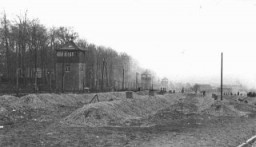You searched for: jewish
<< Previous | Displaying results 2476-2500 of 2504 for "jewish" | Next >>
-
Wilek (William) Loew describes the roundup of Jews during August 1942 deportation from Lvov to Belzec
Oral HistoryWilek was the son of Jewish parents living in the southeastern Polish town of Lvov. His family owned and operated a winery that had been in family hands since 1870. Wilek's father died of a heart attack in 1929. Wilek entered secondary school in 1939. Soon after he began school, World War II began with the German invasion of Poland. Lvov was in the part of eastern Poland annexed by the Soviet Union. Although the Soviets took over Wilek's home and the family business, Wilek was able to continue his…
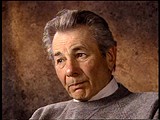
-
Henny Fletcher Aronsen describes a roundup in the Kovno ghetto
Oral HistoryHenny was born into an upper-middle-class Jewish family in Kovno, Lithuania. She and her brother attended private schools. In June 1940 the Soviets occupied Lithuania, but little seemed to change until the German invasion in June 1941. The Germans sealed off a ghetto in Kovno in August 1941. Henny and her family were forced to move into the ghetto. Henny married in the ghetto in November 1943; her dowry was a pound of sugar. She survived several roundups during which some of her friends and family were…
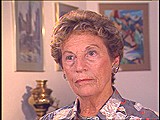
-
Isadore Helfing describes labor in the Treblinka camp
Oral HistoryIsadore was born to a Jewish family in Kielce, Poland. Germany invaded Poland in September 1939. Isadore and his family were forced into the Kielce ghetto, which was established in April 1941. When his parents were deported to the Treblinka killing center in 1942, Isadore went with them rather than remaining behind for forced labor. After arrival at the camp, Isadore hid in a pile of bodies. His parents were killed. Isadore survived by working in the camp. On August 2, 1943, prisoners at Treblinka revolted…
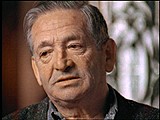
-
William (Bill) Lowenberg describes forced labor in the Kaufering subcamp of the Dachau concentration camp
Oral HistoryAs a boy, Bill attended school in Burgsteinfurt, a German town near the Dutch border. After the Nazis came to power in Germany in January 1933, Bill experienced increasing antisemitism and was once attacked on his way to Hebrew school by a boy who threw a knife at him. In 1936, he and his family left Germany for the Netherlands, where they had relatives and thought they would be safe. However, after Germany invaded the Netherlands in May 1940, antisemitic legislation--including the order to wear the Jewish…
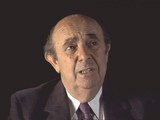
-
Wilek (William) Loew describes forced evacuation from Auschwitz
Oral HistoryWilek was the son of Jewish parents living in the southeastern Polish town of Lvov. His family owned and operated a winery that had been in family hands since 1870. Wilek's father died of a heart attack in 1929. Wilek entered secondary school in 1939. Soon after he began school, World War II began with the German invasion of Poland. Lvov was in the part of eastern Poland annexed by the Soviet Union. Although the Soviets took over Wilek's home and the family business, Wilek was able to continue his…
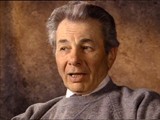
-
Charlene Schiff describes the Soviet occupation of Horochow after the outbreak of World War II
Oral HistoryBoth of Charlene's parents were local Jewish community leaders, and the family was active in community life. Charlene's father was a professor of philosophy at the State University of Lvov. World War II began with the German invasion of Poland on September 1, 1939. Charlene's town was in the part of eastern Poland occupied by the Soviet Union under the German-Soviet Pact of August 1939. Under the Soviet occupation, the family remained in its home and Charlene's father continued to teach. The Germans…
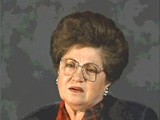
-
Sophie Turner-Zaretsky describes how she began to work through her experience as a hidden child
Oral HistorySophie was born Selma Schwarzwald to parents Daniel and Laura in the industrial city of Lvov, two years before Germany invaded Poland. Daniel was a successful businessman who exported timber and Laura had studied economics. The Germans occupied Lvov in 1941. After her father's disappearance on her fifth birthday in 1941, Sophie and her mother procured false names and papers and moved to a small town called Busko-Zdroj. They became practicing Catholics to hide their identities. Sophie gradually forgot that…
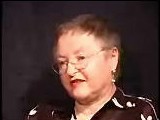
-
Sam Itzkowitz describes the first moments of liberation
Oral HistoryThe Germans invaded Poland in September 1939. When Makow was occupied, Sam fled to Soviet territory. He returned to Makow for provisions, but was forced to remain in the ghetto. In 1942, he was deported to Auschwitz. As the Soviet army advanced in 1944, Sam and other prisoners were sent to camps in Germany. The inmates were put on a death march early in 1945. American forces liberated Sam after he escaped during a bombing raid.
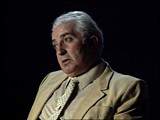
-
Aron (Dereczynski) Derman describes events that took place upon the German invasion of Slonim, Poland
Oral HistoryAron was born to a middle-class Jewish family in Slonim, a part of Poland between the two world wars. His parents owned a clothing store. After studying in a technical school, Aron worked as a motion-picture projectionist in a small town near Slonim. The Soviet army took over Slonim in September 1939. War broke out between Germany and the Soviet Union in June 1941. Aron returned to Slonim. The Germans soon occupied Slonim, and later forced the Jews into a ghetto. Aron was forced to work in an armaments…
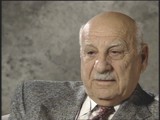
-
Gerda Blachmann Wilchfort describes the mood of passengers on the "St. Louis" after they were denied entry into Cuba
Oral HistoryGerda and her parents obtained visas to sail to Cuba on the "St. Louis" in May 1939. When the ship arrived in Havana harbor, most of the refugees were denied entry and the ship had to return to Europe. Gerda and her parents disembarked in Belgium. In May 1940, Germany attacked Belgium. Gerda and her mother escaped to Switzerland. After the war, they were told that Gerda's father had died during deportation.
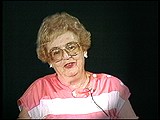
-
Charlene Schiff describes difficulties in gaining entry to the United States in the aftermath of the Holocaust
Oral HistoryBoth of Charlene's parents were local Jewish community leaders, and the family was active in community life. Charlene's father was a professor of philosophy at the State University of Lvov. World War II began with the German invasion of Poland on September 1, 1939. Charlene's town was in the part of eastern Poland occupied by the Soviet Union under the German-Soviet Pact of August 1939. Under the Soviet occupation, the family remained in its home and Charlene's father continued to teach. The Germans…
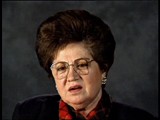
-
Suse Gruenbaum Schwarz describes preparation for and hiding during a Nazi raid
Oral HistorySuse's family moved to the Netherlands in 1933. After invading the Netherlands in 1940, the Germans imposed anti-Jewish measures. From 1942, Suse could not attend school. The family went into hiding in 1943, Suse and her mother on one farm and her father on another. Later, her father and another couple came to hide with Suse. They were liberated in 1945. Suse arrived in the United States in 1947.
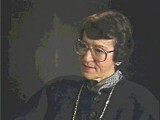
-
Aron (Dereczynski) Derman describes the German destruction of the Slonim ghetto
Oral HistoryDescribes the German destruction of the Slonim ghetto
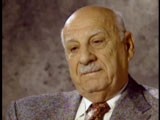
-
Wilek (William) Loew describes forced labor in Lvov
Oral HistoryWilek was the son of Jewish parents living in the southeastern Polish town of Lvov. His family owned and operated a winery that had been in family hands since 1870. Wilek's father died of a heart attack in 1929. Wilek entered secondary school in 1939. Soon after he began school, World War II began with the German invasion of Poland. Lvov was in the part of eastern Poland annexed by the Soviet Union. Although the Soviets took over Wilek's home and the family business, Wilek was able to continue his…
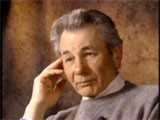
-
Wilek (William) Loew describes refugees from western Poland after their arrival in Soviet-occupied Lvov
Oral HistoryWilek was the son of Jewish parents living in the southeastern Polish town of Lvov. His family owned and operated a winery that had been in family hands since 1870. Wilek's father died of a heart attack in 1929. Wilek entered secondary school in 1939. Soon after he began school, World War II began with the German invasion of Poland. Lvov was in the part of eastern Poland annexed by the Soviet Union. Although the Soviets took over Wilek's home and the family business, Wilek was able to continue his…
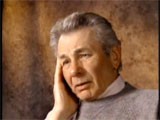
-
Wilek (William) Loew describes the Soviet occupation of Lvov in 1939
Oral HistoryWilek was the son of Jewish parents living in the southeastern Polish town of Lvov. His family owned and operated a winery that had been in family hands since 1870. Wilek's father died of a heart attack in 1929. Wilek entered secondary school in 1939. Soon after he began school, World War II began with the German invasion of Poland. Lvov was in the part of eastern Poland annexed by the Soviet Union. Although the Soviets took over Wilek's home and the family business, Wilek was able to continue his…
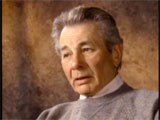
-
Dachau concentration camp
Animated MapView an animated map showing key events in the history of the Dachau concentration camp, which was established by the Nazi regime in 1933.
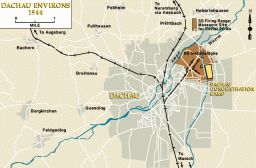
-
Concentration Camp System: In Depth
ArticleThe Nazi regime's extensive camp system included concentration camps, forced-labor camps, prisoner-of-war camps, transit camps, and killing centers.
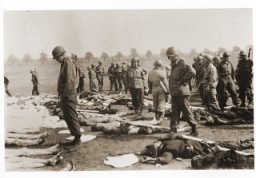
-
World War I and its Aftermath: Key Dates
ArticleExplore a timeline of key events in the history of World War I and its aftermath. Learn about the conflict and its divisive peace.

-
What conditions, ideologies, and ideas made the Holocaust possible?
Discussion QuestionThe leaders of Nazi Germany, a modern, educated society, aimed to destroy millions of men, women, and children because of their Jewish identity. Understanding this process may help us to better understand the condit...
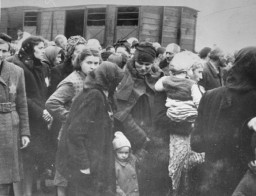
-
Charlene Schiff describes conditions in the Horochow ghetto
Oral HistoryBoth of Charlene's parents were local Jewish community leaders, and the family was active in community life. Charlene's father was a professor of philosophy at the State University of Lvov. World War II began with the German invasion of Poland on September 1, 1939. Charlene's town was in the part of eastern Poland occupied by the Soviet Union under the German-Soviet Pact of August 1939. Under the Soviet occupation, the family remained in its home and Charlene's father continued to teach. The Germans…
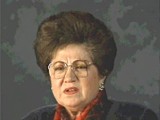
-
Felix Horn describes a hiding place in Warsaw
Oral HistoryFelix was born to an assimilated Jewish family in Lublin, Poland. His father was a locksmith and his mother was a singer. Following the German invasion of Poland on September 1, 1939, Felix fled east to Rovno and then to Soviet-occupied Lvov, where he was accepted at a medical school. After the German invasion of the Soviet Union in June 1941, Felix was taken to a labor camp. He escaped and returned to Lublin, and found that his family had been forced into the ghetto established there. After the…
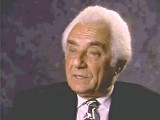
-
Felix Horn describes escaping from the Majdan Tatarski ghetto and seeking shelter
Oral HistoryFelix was born to an assimilated Jewish family in Lublin, Poland. His father was a locksmith and his mother was a singer. Following the German invasion of Poland on September 1, 1939, Felix fled east to Rovno and then to Soviet-occupied Lvov, where he was accepted at a medical school. After the German invasion of the Soviet Union in June 1941, Felix was taken to a labor camp. He escaped and returned to Lublin, and found that his family had been forced into the ghetto established there. After the…
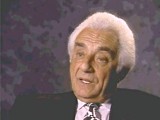
-
Leo Bretholz describes his escape from a train during deportation from the Drancy camp
Oral HistoryAfter the Germans annexed Austria in 1938, Leo attempted to flee. He eventually reached Belgium. In 1940 he was deported to the St.-Cyprien camp in France but escaped. In 1942 Leo was smuggled into Switzerland but was arrested and sent back to France, this time to the Rivesaltes and Drancy camps. He and a friend escaped from a train deporting them to Auschwitz in Poland. Leo joined the French underground in 1943. He arrived in the United States in 1947.
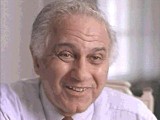
-
President Obama's Remarks at Buchenwald
ArticlePresident Barack Obama visited Buchenwald concentration camp in Germany on June 5, 2009. In a speech at the site, he repudiated Holocaust denial. Browse transcript.
